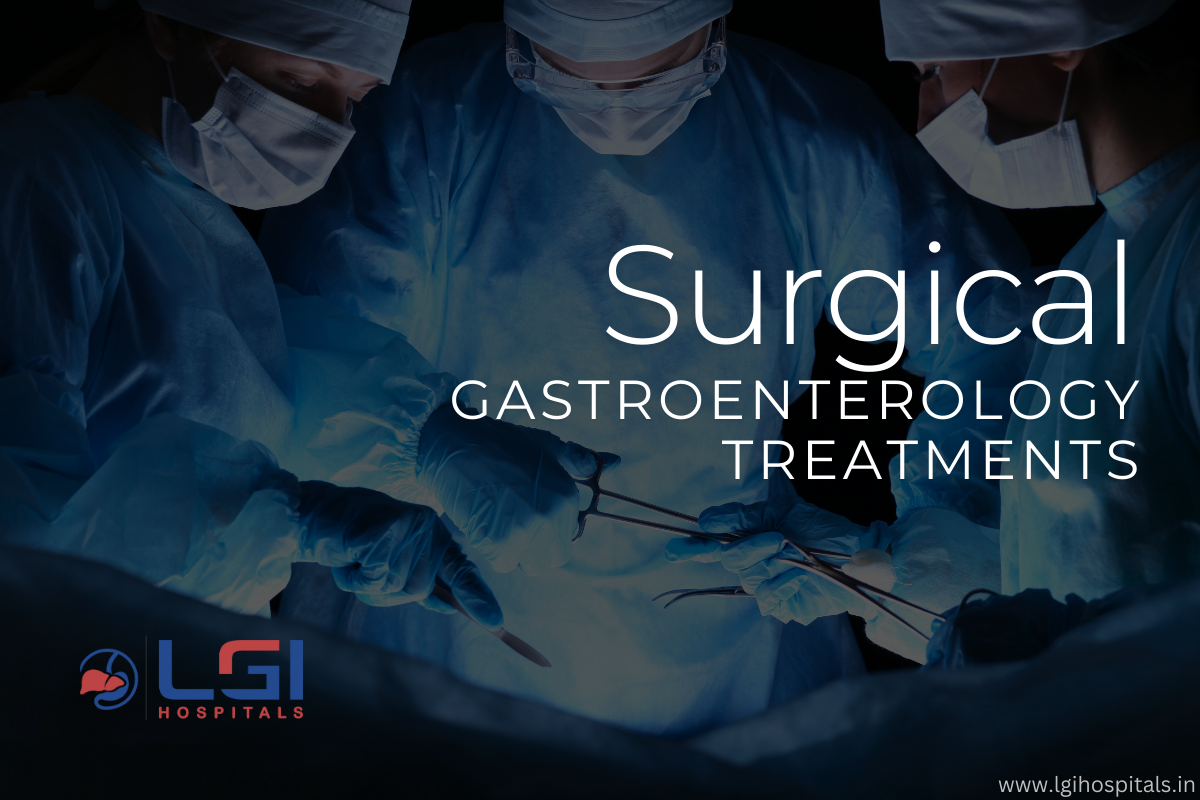Surgical gastroenterology is a specialized branch of medicine that focuses on diagnosing and treating disorders of the digestive system through surgical procedures. From minor ailments to complex conditions, surgical gastroenterologists play a vital role in improving patients’ digestive health and quality of life. Moreover, this blog explains some common conditions treated by surgical gastroenterologists, detailing what the treatments involve, and highlighting how the expertise of hospitals like LGI Hospital ensures better outcomes for patients. Ultimately, understanding these treatments can help patients make informed decisions about their digestive health care.
1. Gallstones and Gallbladder Disorders
Gallstones are small, hardened deposits that form in the gallbladder and can cause severe pain, nausea, and digestive problems. Surgical gastroenterologists often perform cholecystectomy, a procedure to remove the gallbladder, which is typically done laparoscopically for a faster recovery.
Other gallbladder disorders, like infections or inflammation, may also require surgical intervention. Treating these issues promptly can prevent complications such as bile duct blockages.
2. Hernias
Hernias occur when an organ pushes through a weak spot in the muscle or tissue, often in the abdominal wall. Types of hernias include:
- Inguinal Hernia: Common in the groin area.
- Umbilical Hernia: Occurs around the belly button.
- Hiatal Hernia: Involves the upper stomach pushing through the diaphragm.
Surgical gastroenterologists repair hernias using advanced techniques, including minimally invasive surgery, to restore strength to the affected area and relieve symptoms.
3. Appendicitis
Appendicitis is a condition where the appendix becomes inflamed and requires immediate medical attention. If left untreated, it can rupture, leading to severe infections. Surgical gastroenterologists perform appendectomies—removal of the appendix—either through traditional surgery or laparoscopic methods, ensuring quick recovery and minimal discomfort.
4. Colorectal Cancer and Polyps
Colorectal cancer starts in the colon or rectum and is one of the leading causes of cancer-related deaths worldwide. Early detection and treatment significantly improve outcomes.
Surgical gastroenterologists perform procedures like:
- Polypectomy: Removal of polyps during a colonoscopy.
- Colectomy: Removal of part or all of the colon if cancer is detected.
Advanced techniques, such as robotic and laparoscopic surgery, ensure precision and faster recovery.
5. Acid Reflux and GERD (Gastroesophageal Reflux Disease)
Chronic acid reflux, or GERD, can lead to complications like esophagitis, Barrett’s esophagus, or strictures. In cases where lifestyle changes and medications fail, surgical options like fundoplication are considered. This procedure reinforces the lower esophageal sphincter, preventing stomach acid from flowing back into the esophagus.
6. Pancreatitis
Pancreatitis, an inflammation of the pancreas, can be acute or chronic. While mild cases are managed with medication, severe or recurrent cases often require surgical intervention.
Surgical gastroenterologists may perform procedures like:
- Removal of pancreatic cysts or stones.
- Partial or total pancreatectomy for chronic conditions.
Proper treatment is crucial to prevent complications like infections or diabetes.
7. Inflammatory Bowel Diseases (IBD)
Inflammatory bowel diseases, such as Crohn’s disease and ulcerative colitis, are chronic conditions affecting the digestive tract. In severe cases, surgical treatment becomes necessary.
Surgical options include:
- Strictureplasty: Widening of narrowed areas of the intestines.
- Colectomy: Removal of diseased sections of the colon.
Patients benefit from surgical treatments that aim to relieve symptoms, improve quality of life, and prevent disease progression.
8. Obstructions in the Digestive Tract
Blockages in the digestive tract can result from tumors, scar tissue, or other causes. These obstructions can lead to severe pain, nausea, and vomiting. Surgical gastroenterologists remove or bypass the obstruction to restore normal digestion.
9. Liver Diseases
Liver diseases like cirrhosis, liver cysts, or tumors may require surgical treatment. Procedures such as partial hepatectomy (removal of part of the liver) or liver transplantation are performed by specialized teams, including surgical gastroenterologists.
10. Esophageal Disorders
Esophageal conditions, including achalasia, strictures, or cancer, can impair swallowing and cause discomfort. Surgical options like esophagectomy (removal of part of the esophagus) or myotomy (to treat achalasia) help restore proper esophageal function.
11. Bariatric Surgery for Obesity
Bariatric surgery is not only for weight loss but also for improving conditions associated with obesity, such as type 2 diabetes and GERD. Common procedures include gastric bypass and sleeve gastrectomy. Surgical gastroenterologists carefully evaluate candidates to ensure successful outcomes.
12. Gastrointestinal Bleeding
Uncontrolled bleeding in the digestive tract can be life-threatening and often requires immediate surgical intervention. Surgical gastroenterologists identify the source of the bleeding and use techniques like endoscopic banding or resection to address the issue.
13. Stomach Cancer
Surgical treatment is often a key component of stomach cancer management. Gastrectomy, the removal of part or all of the stomach, is a common procedure performed by surgical gastroenterologists. With early detection, surgery can significantly improve survival rates.
Expertise at LGI Hospital
At LGI Hospital, we understand that gastrointestinal conditions can be challenging and impact every aspect of life. Our surgical gastroenterology team, led by the renowned Dr. Yogesh Bang, is dedicated to providing advanced and compassionate care.
Dr. Bang is a leader in the field, offering expertise in minimally invasive and complex surgeries, ensuring patients receive the best outcomes. LGI Hospital is equipped with state-of-the-art technology, modern surgical facilities, and a patient-centered approach that ensures comfort and safety throughout the treatment process.
If you or a loved one is dealing with a digestive disorder, trust LGI Hospital to provide the highest standard of care. Book a consultation today and take the first step toward better health.

